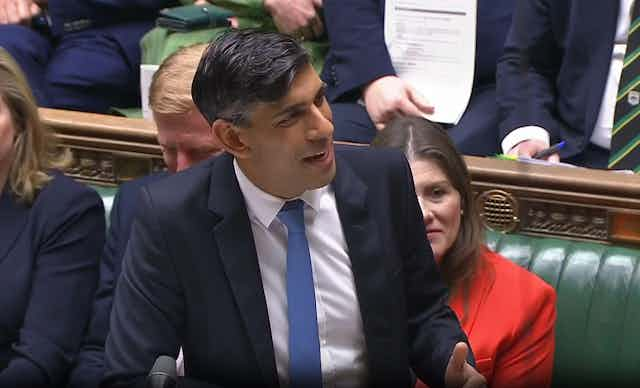In response to the outcry over what he described as “one of the greatest miscarriages of justice in our nation’s history”, Prime Minister Rishi Sunak has promised to overturn the criminal convictions of more than 700 sub-postmasters falsely accused of theft or false accounting between 2000 and 2014. In doing so, he vowed he would deliver “justice and compensation”.
This will involve introducing emergency primary legislation in the form of a new act of parliament. The Labour party has committed to supporting the move “if it meets the test of justice”.
With all major parties in favour, it is possible that unprecedented legislation will be passed in parliament by the end of the year to clear the names of the people caught up in the Post Office scandal. Political action is needed to right this wrong, but we should also be aware that Sunak’s plan challenges British constitutional principles of the separation of power and the rule of law.
Separation of power
Under the principle of separation of power, all three parts of government: parliament, judges (courts), and the prime minister and ministers (the executive), have distinct constitutional roles. This is to prevent abuse of power.
In the UK there is some merging of roles because ministers need to be part of parliament before they can be appointed to the executive. This gives the Conservative party of Rishi Sunak considerable power to effect legal change, as it is currently the political party with a majority of seats in parliament.
The rule of law is also a fundamental principle of the the UK constitution. It prevents parliament from interfering with court judgments, leaving the courts free from political influence.
New legislation is welcome in bringing justice to sub-postmasers who have been fighting for 20 years. There were more than 900 prosecutions by the Post Office and so far only 95 convictions have been overturned.
The Criminal Cases Review Commission is underfunded and it would take years to work through appeals for every Post Office case, especially given that the justice system is on the point of collapse and needing “urgent” investment.
That leaves emergency legislation as the most practical option at this stage. But concerns have been expressed by lawyers and politicians. Dominic Grieve, the former attorney general, was of the view that this is “in a sense a parliamentary interference” because MPs will be disregarding the decision of a court.
Kevin Hollinrake, the minister in charge of postal affairs, said this case is an extraordinary one and that the action being taken “must not, must never, be seen as precedent”. There is justified concern that if parliament steps in to tell the criminal courts they were wrong in this case (even though they were), it opens the door for it do so again, and potentially for a less noble cause.

Parliament is, for example, currently passing other “emergency” legislation that overrides the supreme court judgment that it is not safe for the UK government to deport asylum seekers to Rwanda. Human rights charity Liberty has called this “nothing short of constitutional vandalism and an attack on the separation of powers”.
Avoiding setting a precedent
The UK does not have a written constitution, and that gives those in power considerable flexibility to change constitutional practice and laws. As warned by David McNeill, director of public affairs at the Law Society, the government is effectively legislating against court decisions and against the independence of the courts.
There is no guarantee that this “exceptional” law to meet the unique circumstances of the Post Office Scandal will be a one-off.
Rishi Sunak has said “everyone was shocked” by watching the ITV drama that detailed the injustices levelled against Post Office works. This is surprising, at least on his part though. Sunak leads a government that has already set up an inquiry into the scandal.
Much more is needed from the government. It is shocking that this scandal has gone on for so many years without more government action, and that emergency legislation endangering the constitution is now needed.
As yet there is no timetable for the legislation, but detail is promised within weeks. When it does appear, it should be closely scrutinised to ensure it provides justice for all victims, but also to prevent damaging key constitutional principles.
If used effectively for the Post Office victims, it is difficult to see parliament not being able to use the tool again to meet the claims of another group. There are no constitutional limits to it doing so.
In an uncodified British constitution, parliament is sovereign and primary legislation cannot be challenged or set aside by the courts. The British constitution is so fluid that once the proposals become law, there is a precedent for the future use of such power.
Using primary legislation to change court decisions, damaging key constitutional principles of separation of power and the judicial independence, could become a new tool of government.
As stated by a retired judge, Her Honour Isobel Plumstead, exoneration by an act of parliament is a “dangereous path” to follow. There are other options that could be considered, such as providing immediate funding to speed up appeals or setting up a special panel of retired judges or senior lawyers to screen all cases.
Legislation, even to a difficult and pressing issue, should not be used as a short-term fix if it threatens the independence of the courts and rule of law.

